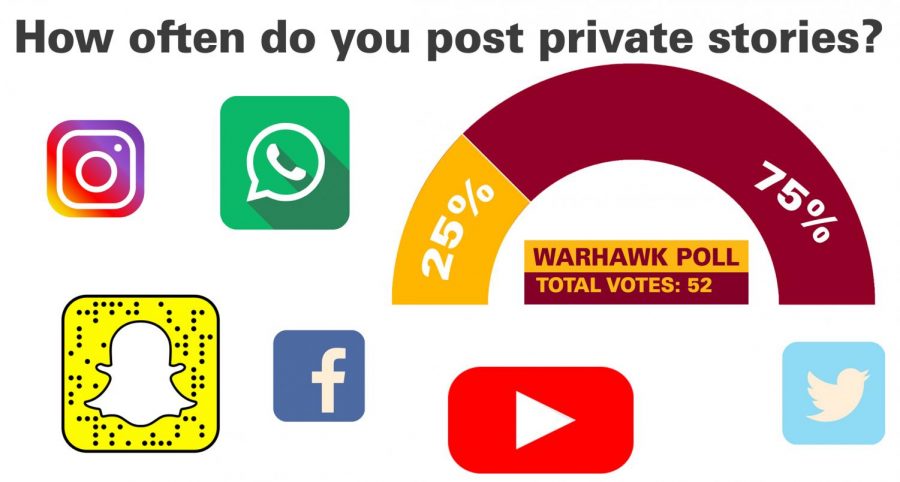Social media platforms introduce private stories
September 3, 2019
There have always been features on social media to control who sees what, but those features were often hard to find and hard to understand. Now, Instagram and Snapchat have created a simpler way to personalize your social media with private stories. A private story lets users add specific people to a list of close friends who will then get to see exclusive content that’s hidden from others.
The more personal the information shared, the closer a person becomes to whoever they share it with, according to social penetration theory. So, if someone is posting their most private thoughts to a couple hundred people on social media, they are lessening the effects of sharing personal information with others. But private stories can bring the person posting the story closer together with the people they allow to view it.
Sophomore pre-nursing major, Nick Johnson, uses private Snapchat stories every day. Johnson prefers posting Snapchats of him goofing off or quoting inside jokes only for his best friends to see. It brings a sense of closeness between him and his group of friends.
“Having a private story is great, because I only let my weird friends, who understand my inside jokes, watch it,” Johnson said. “Which is way better to have than 412 ‘randoms’ trying to figure out what’s going on.”
Private stories on Instagram and Snapchat are also a useful tool for private people like senior English major, Adarian Turner. She is uncomfortable with the idea of all her followers seeing what she does every day, but she doesn’t want to be rude by unfriending anyone.
“We should have the ability to choose who views specific content in an effective and simple way, and private stories give us access to that ability,” Turner said.
However, not everyone is ready to make the switch from public to private stories. According to Dr. Bill McCown, a licensed clinical psychologist and coordinator of ULM’s psychology program, this is because some people value privacy more than others by nature. An open person may think a private person is hiding something from them while a private person may think an open person is too willing to share their personal information.
“What feels normal for one person is not necessarily the same for someone else,” Dr. McCown said. “Life works best when we respect our differences.”
Junior criminal justice major, Katelyn Gaudin, said private stories are useless. She doesn’t use the feature, because she doesn’t see the point in posting something if a person wants it to be private.
“It wouldn’t matter if people had private stories or not,” Gaudin said. “If someone really wants to post something, they’ll post it.”
Sophomore psychology major, Austin Pasche, agrees with Gaudin. He is an open book and has never created a private story, because he said he has nothing to hide. But Pasche does see the possibility of a greater threat associated with private stories. He said children with access to social media will use private stories to hide things from their parents.
“It’s a bad idea because kids can hide stuff from their parents easier and that can harm them or others in the long run,” Pasche said.
According to Dr. Joshua Comer, assistant communication professor and researcher, private stories are more than a way to form close bonds with people. Private stories also allow social media companies to learn information about users that might not have been shared online without the addition of private stories. Then, social media companies take this information and sell it to advertisers.
“Social media companies have introduced new or streamlined features that simplify how users can control who sees what information,” Comer said. “Those features lower barriers to communicating highly personal information on social media, making it simpler and more comfortable to share something that might not have otherwise been posted.”



